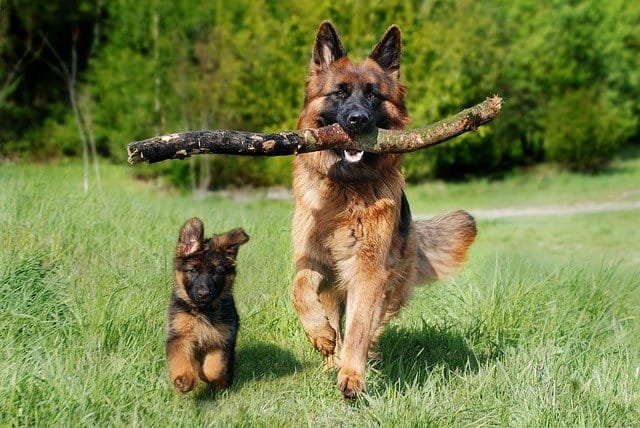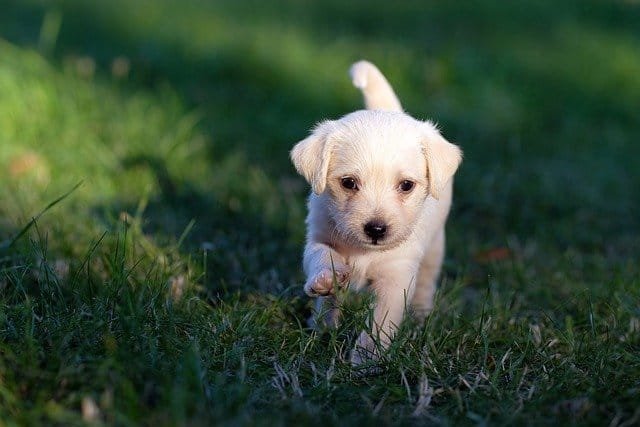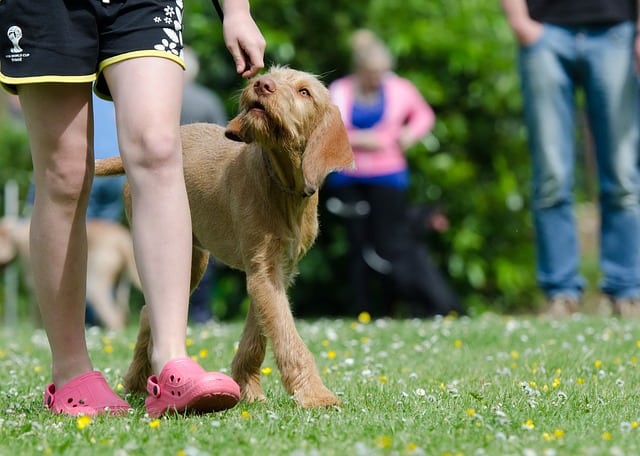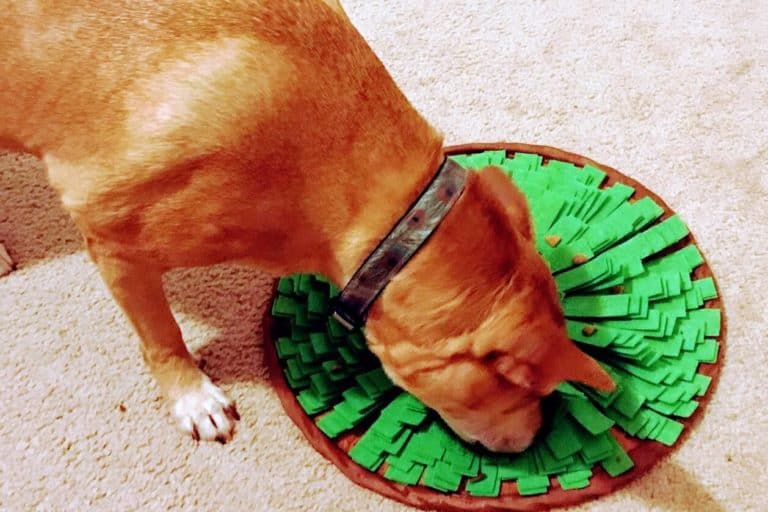The Best Way to Socialize a Dog

There are some affiliate links below, but they are all products I highly recommend. For more info, view my disclosure here.
As a new dog parent, you hear how important it is to socialize a dog. From the time that a puppy is born to the rest of a dog’s life, it is vital that regular social opportunities with other dogs, pets, and people are something that a dog is regularly exposed to.
Socialization allows both humans and animals the opportunity to learn how to interact with others, make sense of their environment, and develop their confidence and skills.
Without an opportunity to socialize effectively, dogs can become socially inept, withdrawn, and even aggressive. Socialization is essential so that dogs do not develop negative psychological behaviors that impact their lives and their owners’ lives negatively.
Through the support of other dog owners, advice from vets, attending dog classes, and accessing local facilities, there is an abundance of ways and opportunities that dogs can develop social skills and become healthy and happy pets.
The information below provides a strong insight into tips and techniques that can help dog owners cultivate strong social skills and learn ways to socialize your dog.

Ways to Socialize Your Puppy
During the first 6-13 weeks of a puppy’s life, it is vital that during this time they are exposed to a range of social settings and experiences. This period is known as the ‘main socialization period’ and puppies are able to absorb and learn lots of information.
From the first day that you bring your puppy home, they need to be introduced to different social aspects right from the start.
The range of sights, smells, and sounds around the home will enable a puppy to become familiar with so many different elements of their ever-changing and growing environment; plus, being exposed to neighbors, other family members, and even the doorbell and deliverymen, puppies will also be able to learn how to forge relationships with other people too.
When thinking about the best way to socialize a puppy, it is fundamental that puppies socialize from an early age. It is also important that this is done in a safe environment and that there is steady and progressive exposure to new environments.
Taking your puppy on short trips to other friends’ and families’ homes is a great way for a puppy to develop their sense of adventure while getting the opportunity to meet other animals and people.
During these encounters, puppies are able to learn how to interact with different personalities and also grow in confidence. Additionally, puppy schools can also be an excellent space for dogs to meet other dogs while developing an understanding of boundaries and communication.
Prior to a puppy going farther afield and traveling, it is requisite that they have had all of the required vaccinations; however, once these are complete, short trips via train, bus, and car are all a really good idea for your puppy. Exposure to traffic noise will also contribute to your puppy’s confidence growing and they will be able to recognize a range of urban and rural environments.
Also, before taking your puppy to the park, it is best to receive information and advice from your vet who will guide you on when they are ready for this next step.
If you have a new puppy, see our must-have puppy shopping list here!
Why it’s Important to Socialize a Dog
Socializing a dog is important for so many reasons! First, when a dog is deprived of social contact, in its first stages this can result in a range of unwanted and unhelpful behaviors that will impact their development and ability to form relationships.
Creating opportunities where your dog is able to play and spend time with other dogs and people prevents separation anxiety, fearfulness, and also aggression.
Plenty of social contact also means that as dogs grow older they will have the skills and emotional intelligence to communicate and pick-up on other dog’s communication and cues.
Plus, by ensuring that your dog mixes with both genders, children, and babies, they will become familiar with a collection of responses and interactions.
Second, when both the owner and dog are fully-immersed in the socialization process, this allows both owner and dog to develop deeper levels of trust, understand each other better by observing and understanding how each other behaves in various encounters and allows both to have fun alongside other pets and owners too.
Third, socializing a dog properly also increases their confidence and abilities when training. Initially, if a dog has been introduced to settings and scenarios that were unfamiliar to them, by slowly sussing those out they will have learned that experimentation and healthy risk-taking can result in positive results: just like dog training.
The importance of socialization and how to socialize a dog should not be overlooked and many vets will even emphasize the importance of it is greater than the risk of a dog catching an infection during the meeting stages.

How to Tell if Your Dog is Under-Socialized
One of the key signs to recognize that your dog is under-socialized is often its hesitance, aggressiveness, or anxiety in social settings. Intimidating behavior such as growling or snarling can convey that the dog feels threatened or unsure of the encounter and they are not equipped to handle or judge the situation.
Without earlier and ongoing opportunities to meet dogs of a range of different breeds, statures, and communicating styles, this puts an unsocialized dog at a disadvantage when communicating and may also make them quite defensive.
One way to also identify if your dog is under-socialized is that if they spend more than a couple of seconds to bounce-back from mild hesitation or if he strives to avoid or escape a situation that they don’t feel comfortable in.
A key indicator that your dog is under-socialized and potentially feeling afraid is also if they avoid food that is offered to them in some situations- especially if the food is a treat meal that they would usually be eager to eat. If your dog is experiencing this type of anxiety, they would benefit from taking a trip to the vet where the owner can discuss these issues further.
Usually, for dogs that are renowned for having friendly and outgoing temperaments, it is a sure sign that something is wrong when they don’t respond well to friends or family visiting or if they appear to go into ‘panic mode’ when the doorbell rings.
Similarly, most dogs are eager to get out of the door when offered the chance to go for a walk but if there is a reluctance to go out or be involved in trips, it might be that they are afraid of these activities.
When a dog has not been properly socialized they can also be hypersensitive to all sensory stimulation – especially noises. It isn’t surprising for a dog to be jumpy when it hears fans, the loudness of the rain on a conservatory roof, or alarms buzzing. It isn’t uncommon for dogs to be frightened of especially loud noises such as fireworks; however, the everyday sounds of life can have a more negative and profound impact upon an under-socialized dog.

How to Socialize a Nervous Dog
Some of the key signs that will reflect that your dog is nervous in social circumstances are aggressive behavior, including barking, growling, and jumping; timid and fearful behavior, cowering behind the owner, whining, and even screeching; and. the dog may unexpectedly urinate or defecate in inappropriate situations.
When you are setting out to train your nervous dog and wondering how to socialize a dog it is important that you come at it from a realistic stance and set attainable goals. As an owner, it is part of your responsibility to assess what might be too much for them.
If necessary, begin with small goals and slowly increase the difficulty. For example, if your dog is able to spend time in the backyard, consider allowing your dog to spend time supported in the front yard.
That way, they are in close proximity to home, their safe and known territory, and they are also able to suss-out passers-by, new dogs, and listen to new sounds such as cars passing.
When working towards socializing your nervous dog, aim to make it as much fun and bring as much of a positive and ‘can-do’ attitude as possible.
Don’t be afraid to reward your dog with tasty treats, although ensure that this is nothing too filling. These training treats are great for nervous dogs! You can also increase play-time – whatever it takes to increase your dog’s confidence and commitment to improving their levels of socialization.
Utilizing a slow and steady exposure is often a highly successful approach: taking your dog to the park allows them to see how much fun it can be yet at this stage it is important to keep them on a leash so that they don’t run into any confrontation with other dogs.
Arranged playtime can also be an ideal way to socialize nervous dogs: when a dog is presented with another dog for short periods of time that can be increased over playdates, this enables the dog to calmly develop trust and understanding. Plus, if they have a safe space to retreat to if they become over-stimulated, this will help them to feel less heightened.
But My Dog Is Antisocial!
So, you have an antisocial dog? Hey, it happens! Our Ginger was the best dog ever. She was also NOT a fan of people other than family, or other dogs. And she was perfectly happy that way, and she was so well-behaved and loved, so who were we to try to change her? You know your dog best, and what makes them happy!






